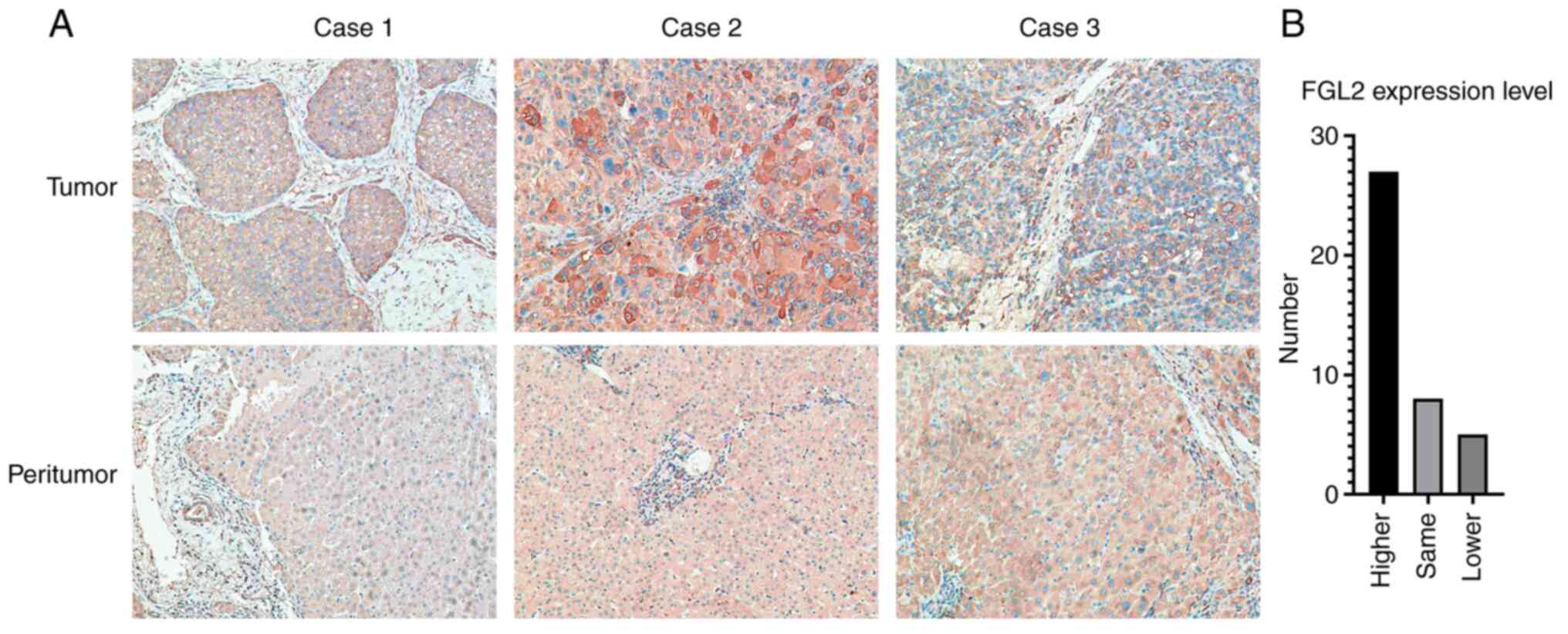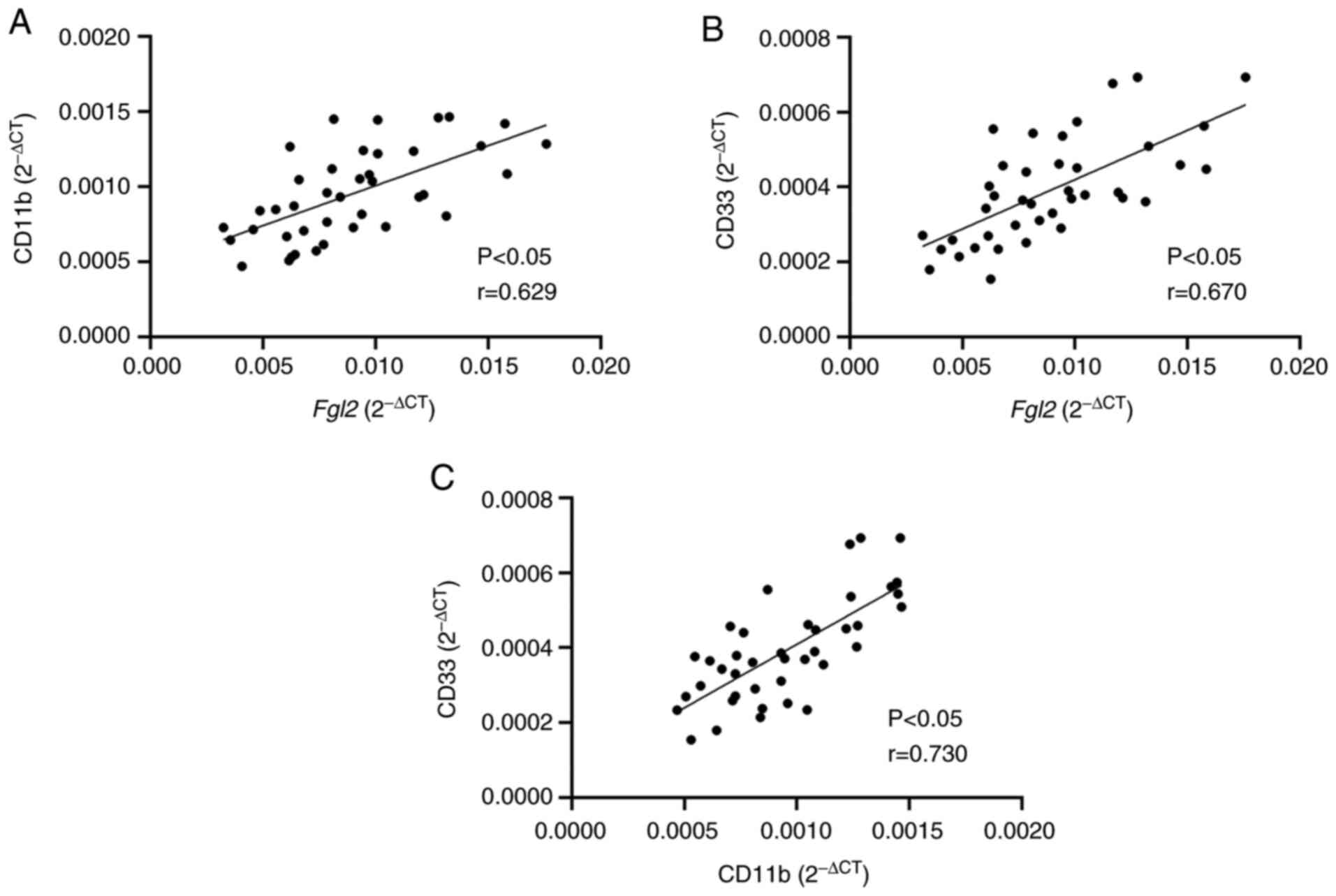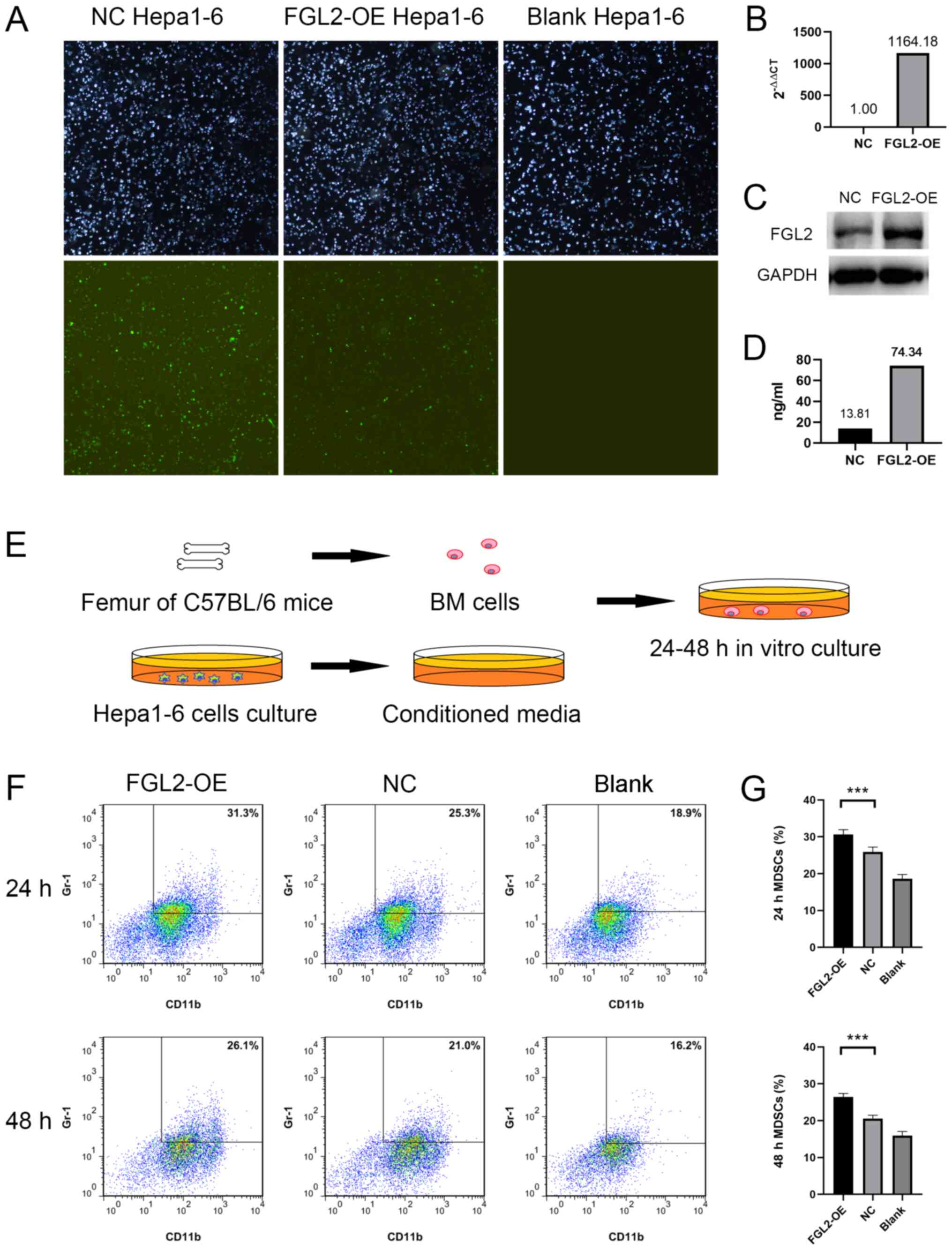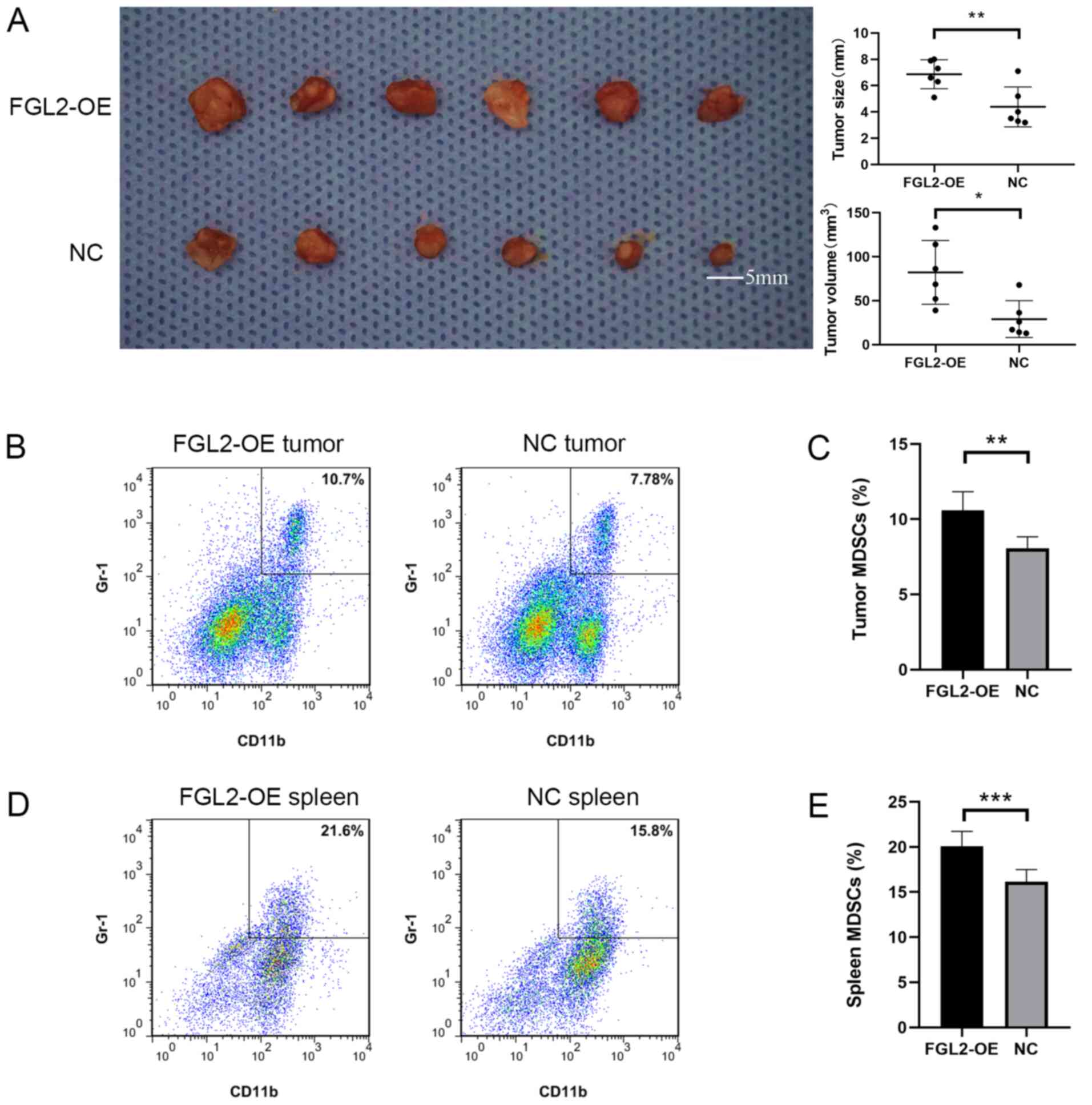|
1
|
An L, Zeng HM, Zheng RS, Zhang SW, Sun KX,
Zou XN, Chen R, Wang SM, Gu XY, Wei WW and He J: Liver cancer
epidemiology in China, 2015. Zhonghua Zhong Liu Za Zhi. 41:721–727.
2019.(In Chinese). PubMed/NCBI
|
|
2
|
Torre LA, Bray F, Siegel RL, Ferlay J,
Lortet-Tieulent J and Jemal A: Global cancer statistics, 2012. CA
Cancer J Clin. 65:87–108. 2015. View Article : Google Scholar : PubMed/NCBI
|
|
3
|
Eggert T and Greten TF: Tumor regulation
of the tissue environment in the liver. Pharmacol Ther. 173:47–57.
2017. View Article : Google Scholar : PubMed/NCBI
|
|
4
|
Wu T and Dai Y: Tumor microenvironment and
therapeutic response. Cancer Lett. 387:61–68. 2017. View Article : Google Scholar : PubMed/NCBI
|
|
5
|
Sevic I, Spinelli FM, Cantero MJ, Reszegi
A, Kovalszky I, García MG and Alaniz L: The role of the tumor
microenvironment in the development and progression of
hepatocellular carcinoma. Hepatocellular Carcinoma [Internet].
Tirnitz-Parker J: Codon Publications; Brisbane (AU): Chapter 2.
2019, simplehttps://www.ncbi.nlm.nih.gov/books/NBK549192/
View Article : Google Scholar
|
|
6
|
Yin Z, Dong C, Jiang K, Xu Z, Li R, Guo K,
Shao S and Wang L: Heterogeneity of cancer-associated fibroblasts
and roles in the progression, prognosis, and therapy of
hepatocellular carcinoma. J Hematol Oncol. 12:1012019. View Article : Google Scholar : PubMed/NCBI
|
|
7
|
Thomas H: LSEC stretch promotes fibrosis
during hepatic vascular congestion. Nat Rev Gastroenterol Hepatol.
16:262–263. 2019. View Article : Google Scholar : PubMed/NCBI
|
|
8
|
Tesi RJ: MDSC; the most important cell you
have never heard of. Trends Pharmacol Sci. 40:4–7. 2019. View Article : Google Scholar : PubMed/NCBI
|
|
9
|
Tahmasebi Birgani M and Carloni V: Tumor
microenvironment, a paradigm in hepatocellular carcinoma
progression and therapy. Int J Mol Sci. 18:4052017. View Article : Google Scholar
|
|
10
|
Novikova MV, Khromova NV and Kopnin PB:
Components of the hepatocellular carcinoma microenvironment and
their role in tumor progression. Biochemistry (Mosc). 82:861–873.
2017. View Article : Google Scholar : PubMed/NCBI
|
|
11
|
Condamine T, Mastio J and Gabrilovich DI:
Transcriptional regulation of myeloid-derived suppressor cells. J
Leukoc Biol. 98:913–922. 2015. View Article : Google Scholar : PubMed/NCBI
|
|
12
|
Porembka MR, Mitchem JB, Belt BA, Hsieh
CS, Lee HM, Herndon J, Gillanders WE, Linehan DC and Goedegebuure
P: Pancreatic adenocarcinoma induces bone marrow mobilization of
myeloid-derived suppressor cells which promote primary tumor
growth. Cancer Immunol Immunother. 61:1373–1385. 2012. View Article : Google Scholar : PubMed/NCBI
|
|
13
|
Sinha P, Okoro C, Foell D, Freeze HH,
Ostrand-Rosenberg S and Srikrishna G: Proinflammatory S100 proteins
regulate the accumulation of myeloid-derived suppressor cells. J
Immunol. 181:4666–4675. 2008. View Article : Google Scholar : PubMed/NCBI
|
|
14
|
Talmadge JE and Gabrilovich DI: History of
myeloid-derived suppressor cells. Nat Rev Cancer. 13:739–752. 2013.
View Article : Google Scholar : PubMed/NCBI
|
|
15
|
Ugel S, De Sanctis F, Mandruzzato S and
Bronte V: Tumor-induced myeloid deviation: When myeloid-derived
suppressor cells meet tumor-associated macrophages. J Clin Invest.
125:3365–3376. 2015. View
Article : Google Scholar : PubMed/NCBI
|
|
16
|
Bergenfelz C and Leandersson K: The
generation and identity of human myeloid-derived suppressor cells.
Front Oncol. 10:1092020. View Article : Google Scholar : PubMed/NCBI
|
|
17
|
Hsieh CC, Hung CH, Lu L and Qian S:
Hepatic immune tolerance induced by hepatic stellate cells. World J
Gastroenterol. 21:11887–11892. 2015. View Article : Google Scholar : PubMed/NCBI
|
|
18
|
Xu Y, Fang F, Jiao H, Zheng X, Huang L, Yi
X and Zhao W: Activated hepatic stellate cells regulate MDSC
migration through the SDF-1/CXCR4 axis in an orthotopic mouse model
of hepatocellular carcinoma. Cancer Immunol Immunother.
68:1959–1969. 2019. View Article : Google Scholar : PubMed/NCBI
|
|
19
|
Kumar V, Patel S, Tcyganov E and
Gabrilovich DI: The nature of myeloid-derived suppressor cells in
the tumor microenvironment. Trends Immunol. 37:208–220. 2016.
View Article : Google Scholar : PubMed/NCBI
|
|
20
|
Yuwaraj S, Ding J, Liu M, Marsden PA and
Levy GA: Genomic characterization, localization, and functional
expression of FGL2, the human gene encoding fibroleukin: A novel
human procoagulant. Genomics. 71:330–338. 2001. View Article : Google Scholar : PubMed/NCBI
|
|
21
|
Marazzi S, Blum S, Hartmann R, Gundersen
D, Schreyer M, Argraves S, von Fliedner V, Pytela R and Rüegg C:
Characterization of human fibroleukin, a fibrinogen-like protein
secreted by T lymphocytes. J Immunol. 161:138–147. 1998.PubMed/NCBI
|
|
22
|
Yang G and Hooper WC: Physiological
functions and clinical implications of fibrinogen-like 2: A review.
World J Clin Infect Dis. 3:37–46. 2013. View Article : Google Scholar : PubMed/NCBI
|
|
23
|
Chan CW, Kay LS, Khadaroo RG, Chan MW,
Lakatoo S, Young KJ, Zhang L, Gorczynski RM, Cattral M, Rotstein O
and Levy GA: Soluble fibrinogen-like protein 2/fibroleukin exhibits
immunosuppressive properties: Suppressing T cell proliferation and
inhibiting maturation of bone marrow-derived dendritic cells. J
Immunol. 170:4036–4044. 2003. View Article : Google Scholar : PubMed/NCBI
|
|
24
|
Liu H, Yang PS, Zhu T, Manuel J, Zhang J,
He W, Shalev I, Zhang L, Cybulsky MI, Grant DR, et al:
Characterization of fibrinogen-like protein 2 (FGL2): Monomeric
FGL2 has enhanced immunosuppressive activity in comparison to
oligomeric FGL2. Int J Biochem Cell Biol. 45:408–418. 2013.
View Article : Google Scholar : PubMed/NCBI
|
|
25
|
Tang M, Cao X, Li P, Zhang K, Li Y, Zheng
QY, Li GQ, Chen J, Xu GL and Zhang KQ: Increased expression of
fibrinogen-like protein 2 is associated with poor prognosis in
patients with clear cell renal cell carcinoma. Sci Rep.
7:126762017. View Article : Google Scholar : PubMed/NCBI
|
|
26
|
Yan J, Kong LY, Hu J, Gabrusiewicz K,
Dibra D, Xia X, Heimberger AB and Li S: FGL2 as a multimodality
regulator of tumor-mediated immune suppression and therapeutic
target in gliomas. J Natl Cancer Inst. 107:djv1372015. View Article : Google Scholar : PubMed/NCBI
|
|
27
|
Zhu Y, Zhang L, Zha H, Yang F, Hu C, Chen
L, Guo B and Zhu B: Stroma-derived fibrinogen-like protein 2
activates cancer-associated fibroblasts to promote tumor growth in
lung cancer. Int J Biol Sci. 13:804–814. 2017. View Article : Google Scholar : PubMed/NCBI
|
|
28
|
Engers R, Mueller M, Walter A, Collard JG,
Willers R and Gabbert HE: Prognostic relevance of Tiam1 protein
expression in prostate carcinomas. Br J Cancer. 95:1081–1086. 2006.
View Article : Google Scholar : PubMed/NCBI
|
|
29
|
Schmittgen TD and Livak KJ: Analyzing
real-time PCR data by the comparative C(T) method. Nat Protoc.
3:1101–1108. 2008. View Article : Google Scholar : PubMed/NCBI
|
|
30
|
Vetsika EK, Koukos A and Kotsakis A:
Myeloid-derived suppressor cells: Major figures that shape the
immunosuppressive and angiogenic network in cancer. Cells.
8:16472019. View Article : Google Scholar
|
|
31
|
Law AMK, Valdes-Mora F and Gallego-Ortega
D: Myeloid-derived suppressor cells as a therapeutic target for
cancer. Cells. 9:5612020. View Article : Google Scholar
|
|
32
|
Tian X, Shen H, Li Z, Wang T and Wang S:
Tumor-derived exosomes, myeloid-derived suppressor cells, and tumor
microenvironment. J Hematol Oncol. 12:842019. View Article : Google Scholar : PubMed/NCBI
|
|
33
|
Andreu P, Johansson M, Affara NI, Pucci F,
Tan T, Junankar S, Korets L, Lam J, Tawfik D, DeNardo DG, et al:
FcRgamma activation regulates inflammation-associated squamous
carcinogenesis. Cancer Cell. 17:121–134. 2010. View Article : Google Scholar : PubMed/NCBI
|
|
34
|
Gabrilovich DI, Ostrand-Rosenberg S and
Bronte V: Coordinated regulation of myeloid cells by tumours. Nat
Rev Immunol. 12:253–268. 2012. View Article : Google Scholar : PubMed/NCBI
|
|
35
|
Hoechst B, Ormandy LA, Ballmaier M, Lehner
F, Krüger C, Manns MP, Greten TF and Korangy F: A new population of
myeloid-derived suppressor cells in hepatocellular carcinoma
patients induces CD4+CD25+Foxp3+ T
cells. Gastroenterology. 135:234–243. 2008. View Article : Google Scholar : PubMed/NCBI
|
|
36
|
Wang D, An G, Xie S, Yao Y and Feng G: The
clinical and prognostic significance of CD14(+) HLA-DR(−/low)
myeloid-derived suppressor cells in hepatocellular carcinoma
patients receiving radiotherapy. Tumour Biol. 37:10427–10433. 2016.
View Article : Google Scholar : PubMed/NCBI
|
|
37
|
Zhang S, Ma X, Zhu C, Liu L, Wang G and
Yuan X: The role of myeloid-derived suppressor cells in patients
with solid tumors: A meta-analysis. PLoS One. 11:e01645142016.
View Article : Google Scholar : PubMed/NCBI
|
|
38
|
Gao XH, Tian L, Wu J, Ma XL, Zhang CY,
Zhou Y, Sun YF, Hu B, Qiu SJ, Zhou J, et al: Circulating
CD14+ HLA-DR−/low myeloid-derived suppressor
cells predicted early recurrence of hepatocellular carcinoma after
surgery. Hepatol Res. 47:1061–1071. 2017. View Article : Google Scholar : PubMed/NCBI
|
|
39
|
Mizukoshi E, Yamashita T, Arai K,
Terashima T, Kitahara M, Nakagawa H, Iida N, Fushimi K and Kaneko
S: Myeloid-derived suppressor cells correlate with patient outcomes
in hepatic arterial infusion chemotherapy for hepatocellular
carcinoma. Cancer Immunol Immunother. 65:715–725. 2016. View Article : Google Scholar : PubMed/NCBI
|
|
40
|
Zhang X, Fu X, Li T and Yan H: The
prognostic value of myeloid derived suppressor cell level in
hepatocellular carcinoma: A systematic review and meta-analysis.
PLoS One. 14:e02253272019. View Article : Google Scholar : PubMed/NCBI
|
|
41
|
Liu H, Shalev I, Manuel J, He W, Leung E,
Crookshank J, Liu MF, Diao J, Cattral M, Clark DA, et al: The
FGL2-FcgammaRIIB pathway: A novel mechanism leading to
immunosuppression. Eur J Immunol. 38:3114–3126. 2008. View Article : Google Scholar : PubMed/NCBI
|
|
42
|
Morris AB, Farley CR, Pinelli DF, Adams
LE, Cragg MS, Boss JM, Scharer CD, Fribourg M, Cravedi P, Heeger PS
and Ford ML: Signaling through the inhibitory Fc receptor
FcgammaRIIB induces CD8+T cell apoptosis to limit T cell
immunity. Immunity. 52:136–150.e6. 2020. View Article : Google Scholar : PubMed/NCBI
|
|
43
|
Selzner N, Liu H, Boehnert MU, Adeyi OA,
Shalev I, Bartczak AM, Xue-Zhong M, Manuel J, Rotstein OD,
McGilvray ID, et al: FGL2/fibroleukin mediates hepatic reperfusion
injury by induction of sinusoidal endothelial cell and hepatocyte
apoptosis in mice. J Hepatol. 56:153–159. 2012. View Article : Google Scholar : PubMed/NCBI
|
|
44
|
Takai T, Li M, Sylvestre D, Clynes R and
Ravetch JV: FcR gamma chain deletion results in pleiotrophic
effector cell defects. Cell. 76:519–529. 1994. View Article : Google Scholar : PubMed/NCBI
|
|
45
|
Ravetch JV and Bolland S: IgG Fc
receptors. Annu Rev Immunol. 19:275–290. 2001. View Article : Google Scholar : PubMed/NCBI
|
|
46
|
Pan G, Zhao Z, Tang C, Ding L, Li Z, Zheng
D, Zong L and Wu Z: Soluble fibrinogen-like protein 2 ameliorates
acute rejection of liver transplantation in rat via inducing
Kupffer cells M2 polarization. Cancer Med. 7:3168–3177. 2018.
View Article : Google Scholar
|
|
47
|
Jin SJ, Liu Y, Deng SH, Liao LH, Lin TL,
Ning Q and Luo XP: Neuroprotective effects of activated protein C
on intrauterine inflammation-induced neonatal white matter injury
are associated with the downregulation of fibrinogen-like protein
2/fibroleukin prothrombinase and the inhibition of pro-inflammatory
cytokine expression. Int J Mol Med. 35:1199–1212. 2015. View Article : Google Scholar : PubMed/NCBI
|
|
48
|
Buonaguro L, Mauriello A, Cavalluzzo B,
Petrizzo A and Tagliamonte M: Immunotherapy in hepatocellular
carcinoma. Ann Hepatol. 18:291–297. 2019. View Article : Google Scholar : PubMed/NCBI
|
|
49
|
Brown ZJ and Greten TF: Hepatocellular
carcinoma: Translational precision medicine approaches (Internet).
Hoshida Y: Immune Therapies Cham (CH): Humana Press. Chapter 12.
2019
|
|
50
|
Ma L, Hernandez MO, Zhao Y, Mehta M, Tran
B, Kelly M, Rae Z, Hernandez JM, Davis JL, Martin SP, et al: Tumor
cell biodiversity drives microenvironmental reprogramming in liver
cancer. Cancer Cell. 36:418–430.e6. 2019. View Article : Google Scholar : PubMed/NCBI
|
|
51
|
Li W, Wang H, Ma Z, Zhang J, Ou-Yang W, Qi
Y and Liu J: Multi-omics analysis of microenvironment
characteristics and immune escape mechanisms of hepatocellular
carcinoma. Front Oncol. 9:10192019. View Article : Google Scholar : PubMed/NCBI
|
|
52
|
Lu C, Rong D, Zhang B, Zheng W, Wang X,
Chen Z and Tang W: Current perspectives on the immunosuppressive
tumor microenvironment in hepatocellular carcinoma: Challenges and
opportunities. Mol Cancer. 18:1302019. View Article : Google Scholar : PubMed/NCBI
|
|
53
|
Liao H, Chen W, Dai Y, Richardson JJ, Guo
J, Yuan K, Zeng Y and Xie K: Expression of programmed cell
death-ligands in hepatocellular carcinoma: Correlation with immune
microenvironment and survival outcomes. Front Oncol. 9:8832019.
View Article : Google Scholar : PubMed/NCBI
|
|
54
|
Hilmi M, Vienot A, Rousseau B and
Neuzillet C: Immune therapy for liver cancers. Cancers (Basel).
12:772019. View Article : Google Scholar
|
|
55
|
van der Heide D, Weiskirchen R and Bansal
R: Therapeutic targeting of hepatic macrophages for the treatment
of liver diseases. Front Immunol. 10:28522019. View Article : Google Scholar : PubMed/NCBI
|
|
56
|
Lu LC, Chang CJ and Hsu CH: Targeting
myeloid-derived suppressor cells in the treatment of hepatocellular
carcinoma: Current state and future perspectives. J Hepatocell
Carcinoma. 6:71–84. 2019. View Article : Google Scholar : PubMed/NCBI
|
|
57
|
Chesney JA, Mitchell RA and Yaddanapudi K:
Myeloid-derived suppressor cells-a new therapeutic target to
overcome resistance to cancer immunotherapy. J Leukoc Biol.
102:727–740. 2017. View Article : Google Scholar : PubMed/NCBI
|


















